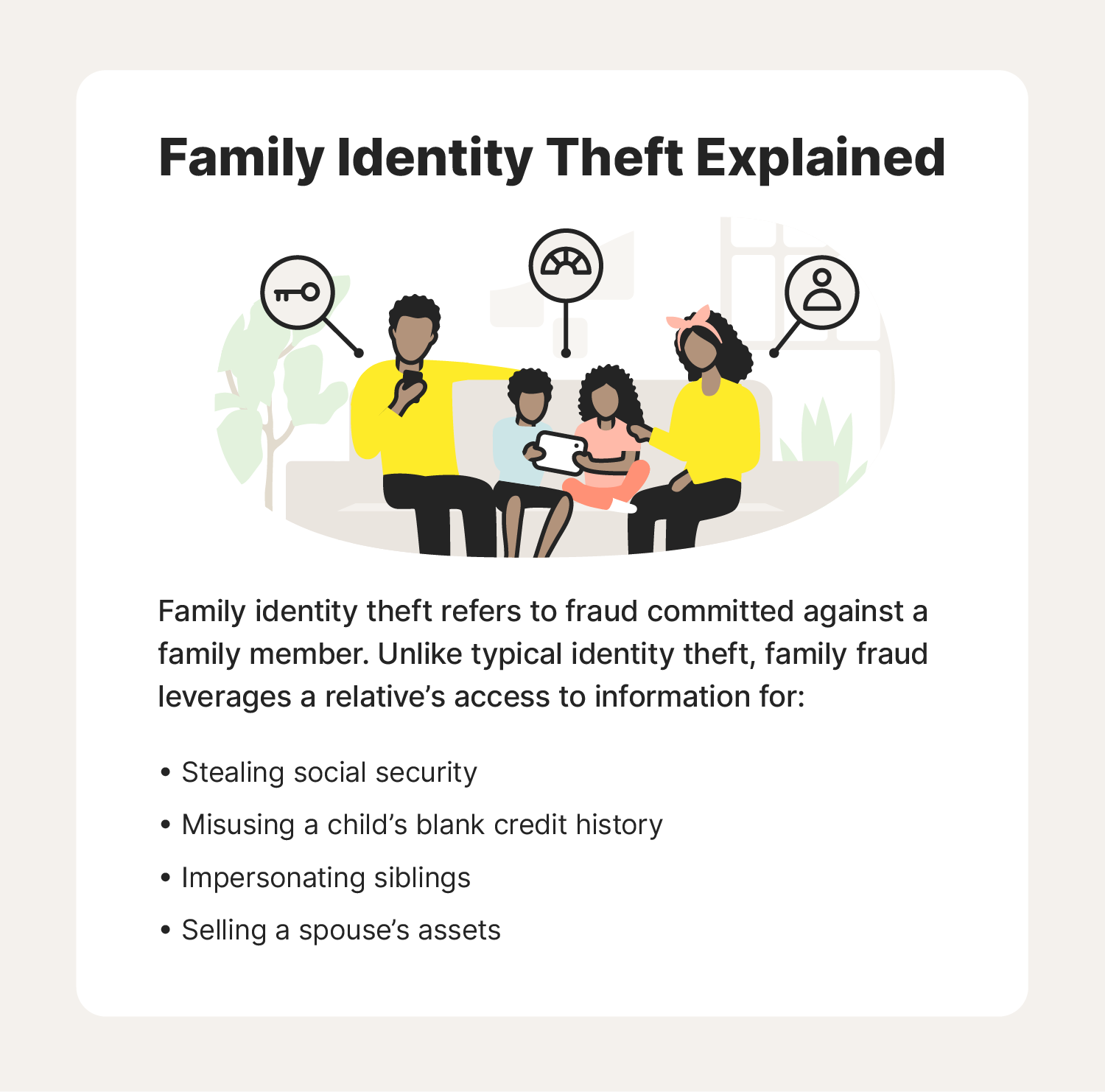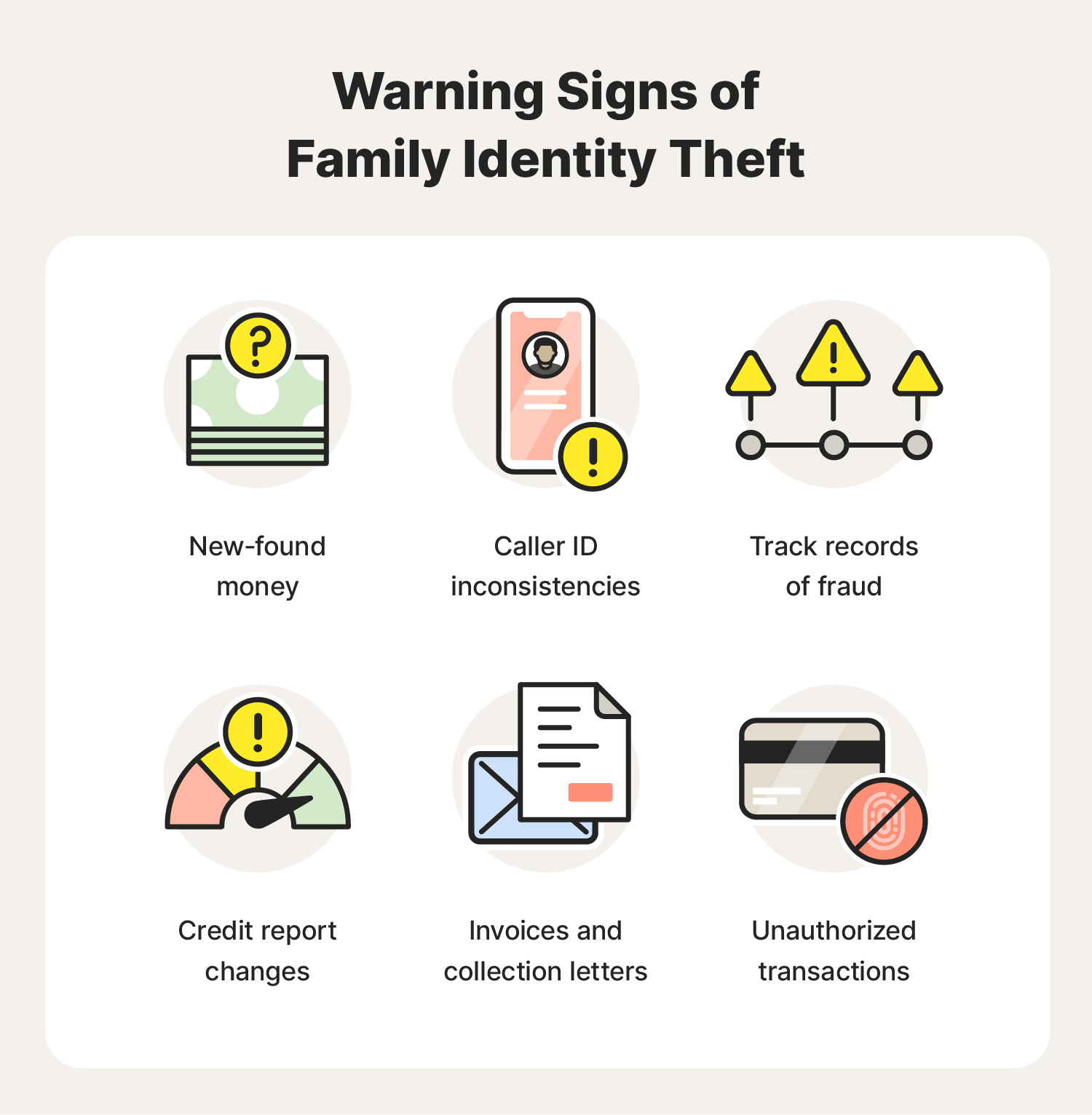Of all the types of identity theft to look out for, family identity theft can cause some of the most damage. Family fraud not only wrecks a relative’s credit but also strains their relationships. To help keep you protected, we'll explain the basics of family identity theft, and how you can use identity theft protection services like LifeLock to help keep you and your family safe.
What is family identity theft?

Family identity theft is a crime that occurs when someone steals a relative's personal information and uses it fraudulently. The data may include their name, address, date of birth, and Social Security number.
Family members often commit identity theft out of financial desperation. Someone with a poor credit score may have trouble getting loans, credit cards, housing, or a job. The motivation to take a family member's identity might include:
- Paying a bill
- Buying a luxury item
- Funding gambling habits
- Selling off their assets
- Collecting their pension or Social Security
Types of family identity theft
The most common types of family fraud include:
- Child identity theft: A child has a blank credit history, which makes it easier to open new accounts and then run up bills. If the parent uses a child’s identity and leaves a trail of bad debts, the child will pay financially and emotionally for years to come.
- Elder identity theft: Elder fraud typically involves stealing from parents or grandparents. Because seniors tend to have savings and good credit, their children may steal funds or open accounts in their name.
- Sibling identity theft: Siblings have easier access to each other’s Social Security numbers and personal documents like passports. If the siblings look alike, one can steal the other's ID for fraud or medical identity theft.
- Spousal identity theft: Spousal fraud usually consists of opening accounts and running up debts in your spouse’s name. Spouses also have easier access to each other’s retirement accounts and assets.
- Deceased family member identity theft: Fraudsters can steal a dead family member’s identity to collect Social Security or access their accounts.
What happens when relatives commit identity fraud?
Family identity theft has the same financial consequences as other types of fraud. The family member who steals another person’s identity can:
- Rack up debts
- Transfer money into their own accounts
- Lower a child’s credit score
- Use the other person’s assets in ways they don’t approve
- Cause emotional damage, including feelings of guilt, betrayal, or isolation
The effects of identity theft cut even deeper when relatives commit fraud. Some family members can cover up their identity theft for a while, but not forever. Years later, their child or sibling might apply for a student loan or a first job, only to discover their damaged credit.
Children who aren’t protected from identity theft face more obstacles as young adults. They lose out on financial options like obtaining a credit card or opening a checking account. They also face the challenge of reclaiming their identities and fixing their financial records. Finally, the psychological damage from their broken trust can haunt them for years.
Warning signs of child identity theft

Some individuals find family identity theft an easy crime to commit. After all, relatives have access to their family’s personal information. Even if other relatives find out about the crime, they may hesitate to call the police. To help spot clues that family fraud has occurred, here are the typical warning signs of family identity theft:
- Newfound money: A relative with persistent financial problems may suddenly appear to have plenty of cash.
- Caller ID inconsistencies: If an incoming call from one relative shows another family member’s name on the caller ID, it could mean they used fraudulent information to get phone service.
- Track records of fraud: Someone with a history of misusing Social Security numbers, including a relative’s number, might do it again. They may even resort to using their child’s Social Security number.
- Credit report changes: Newly opened accounts, inquiries, sudden score drops, and newly registered addresses on a family member’s credit report point to fraud.
- Invoices or collection notices from unfamiliar lenders: These letters indicate that someone opened accounts in your or a relative’s name. If you find notices from companies you don’t recognize, call them for more details.
- Unauthorized transactions on bills: Fraudsters with access to a family member’s account will leave evidence of their purchases on statements.
Steps to protect against family identity theft
If you think a relative has committed fraud or might commit family identity theft, take these steps:
- Call the three main credit bureaus (Experian, Equifax and TransUnion) and ask them to remove information associated with minors in your family. This includes their accounts, inquiries, Social Security Numbers, and collection notices. You will need to provide a copy of the Uniform Minor’s Status Declaration, which establishes their status as a minor.
- Request a manual search of your files. This involves searching for a file with your family member’s name and Social Security number, and one using just the Social Security number. Encourage your family members to do the same.
- Keep secure records regarding your credit and finances. Note the dates you made phone calls or mailed letters with their information. Keep copies of any letters you receive and store your documents in a secure location.
- Destroy old documents if you don’t need them anymore. This way, no one can go through your garbage to dig up your or a family member’s information.
- Place a fraud alert on your credit report. You can contact any of the three main credit bureaus to request the alert, and that bureau will contact the other two.
- Consider placing a credit freeze on your credit reports. Credit freezes restrict access to a credit report, which prevents the opening of new accounts.
- Order your credit reports and review them. Looking over reports can help you spot fraud before it gets out of hand.
- Try identity theft protection services like LifeLock for your family. These services send alerts after signs of fraud and let you lock accounts to prevent theft. A digital identity guard for your family pays for itself by avoiding fraud.
How to respond to family identity theft
When you learn a relative committed fraud, you need to act fast. In most cases, you should go through the following steps:
- Reach out to lenders. Always tell lenders about cases of fraud. Ask them to close any fraudulent accounts and note the presence of identity theft.
- Report identity theft. You can file an identity theft report with the Federal Trade Commission online. To go the extra mile, file a police report to help with pressing charges for identity theft.
- Contact the three main credit bureaus. Reaching out to the bureaus protects a credit score from extra damage. Point out fraudulent purchases in your or your relative’s name to reverse the fraud’s impact on a credit score.
- Set up security measures. Change your passwords and PINs on all financial accounts. You can also freeze your credit or set up a fraud alert for added protection. Finally, you can buy services offering identity theft protection for families, like LifeLock.
- Review your finances going forward. Every month, check any statements and invoices for new signs of fraud. You can also go online to monitor accounts in real-time.
Where can I report family identity theft?
If you suspect child identity theft by a family member, you can't do much alone. If you’re a family friend or relative, you can notify the authorities. Ideally, a parent will report fraud on their child’s behalf after they realize the other parent committed identity theft.
In most cases of family identity theft, you can make a report:
- At IdentityTheft.gov
- On the Federal Trade Commission website or at 877-382-4357
- With your local police department
In cases of elder identity theft, here’s how to reach the Social Security Fraud Hotline:
- Internet: Fraud Reporting Form
- Mail: Social Security Fraud Hotline, P.O. Box 17785, Baltimore, MD 21235
- Phone: 1-800-269-0271
- Fax: 410-597-0118
Protect your family from identity theft
It’s likely that you’ll never be prepared for a betrayal by a family member, especially when talking about family identity theft. Still, by learning about family fraud and identity theft protection, you can look out for your most vulnerable relatives, and you can even go the extra mile by signing up for a LifeLock family plan. Our service scans your whole family’s personal information and sends alerts whenever fraud risks come up. Help keep your family protected with LifeLock.





